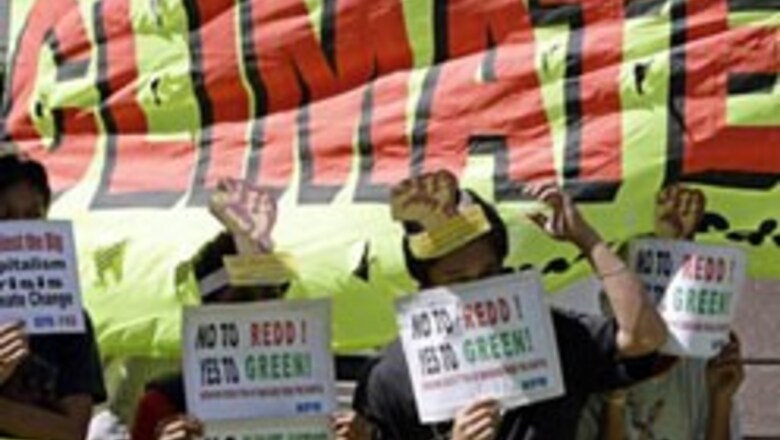
views
Copenhagen: China, India and other developing nations boycotted UN climate talks on Monday, bringing negotiations to a halt with their demand that rich countries discuss much deeper cuts in their greenhouse gas emissions.
Representatives from developing countries--a bloc of 135 nations --said they refused to participate in any formal working groups at the 192-nation summit until the issue was resolved.
The African-led move was a setback for the Copenhagen talks, which were already faltering over long-running disputes between rich and poor nations over emissions cuts and financing for developing countries to deal with climate change.
However, the move Monday was largely seen as a ploy to shift the agenda to the responsibilities of the industrial countries and make emissions reductions the first item for discussion when world leaders begin arriving Tuesday.
"I don't think the talks are falling apart, but we're losing time," said Kim Carstensen, of the World Wildlife Fund. The developing countries "are making a point."
The dispute came as the conference entered its second week, and only days before over 100 world leaders including US President Barack Obama were scheduled to arrive in Copenhagen.
"Nothing is happening at this moment," Zia Hoque Mukta, a delegate from Bangladesh, told The Associated Press. He said developing countries have demanded that conference president Connie Hedegaard of Denmark bring the industrial nations' emissions targets to the top of the agenda before talks can resume.
Poor countries, supported by China, say Hedegaard had raised suspicion that the conference was likely to kill the 1997 Kyoto Protocol, which limited carbon emissions by wealthy countries and imposed penalties for failing to meet those targets.
Poor countries want to extend that treaty because it commits rich nations to emissions cuts and imposes penalties if they fall short. The United States withdrew from Kyoto over concerns that it would harm the U.S. economy and that China, India and other major greenhouse gas emitters were not required to take action.
"We are seeing the death of the Kyoto Protocol," said Djemouai Kamel of Algeria, the head of the 50-nation Africa group.
It was the second time the Africans have disrupted the climate talks. At the last round of negotiations in November, the African bloc forced a one-day suspension until wealthy countries agreed to spell out what steps they will take to reduce emissions.
An African delegate said developing countries decided to block the negotiations at a meeting hours before the conference was to resume. He was speaking on condition of anonymity because the meeting was held behind closed doors. He said applause broke out every time China, India or another country supported the proposal to stall the talks.
PAGE_BREAK
UN climate chief Yvo De Boer said Hedegaard was holding informal consultations with delegates "to get things going."
In Washington, The White House on Monday announced a new program drawing funds from international partners to spend $350 million over five years to give developing nations clean energy technology to curb greenhouse gas emissions and reduce global warming.
The program will distribute solar power alternatives for homes, including sun-powered lanterns, supply cleaner equipment and appliances and work to develop renewable energy systems in the world's poorer nations.
The funding plan grew out of the Major Economies Forum (MEF) established among the world's top economies earlier this year.
The US share of the program will amount to $85 million with the remainder coming from Australia, Britain, Netherlands, Norway and Switzerland, the White House said in a statement.
White House spokesman Robert Gibbs said Energy Secretary Steven Chu is to coordinate with partners in the group to insure immediate action on the program.
British Prime Minister Gordon Brown's office said he would arrive in Copenhagen on Tuesday--two days earlier than previously planned--in an attempt to inject momentum into the climate talks.
"His view is that these negotiations can't wait until the last minute. He believes that we have learnt the lessons from the G-20, that it takes leadership to get involved and try to pull together what is required as soon as possible," Brown's spokesman Simon Lewis told reporters in London.
Lewis denied that Brown--facing a national election by June--was seeking to personal credit if a deal is struck. "He is not seeking to push himself forward, but he has taken a personal view that it is important that, if world leaders can, they should get there early," the spokesman said.
Earlier Monday, British Climate Change Secretary Ed Miliband said it's up to him and his counterparts in Copenhagen to help bridge that gap between rich and poor countries and "not to leave everything" to the world leaders.
"There are still difficult issues of process and substance that we have to overcome in the coming days," Miliband said. "Can we get the emission cuts we need? We need higher ambition from others and we will be pushing for that."




















Comments
0 comment